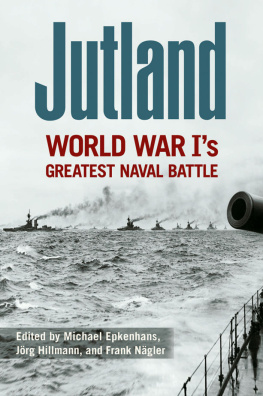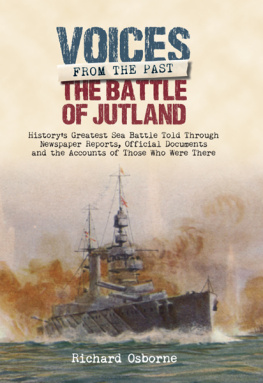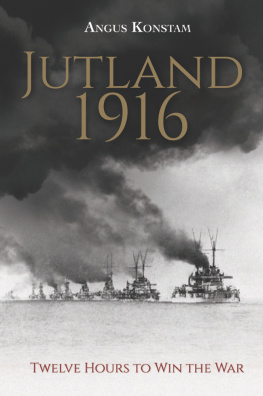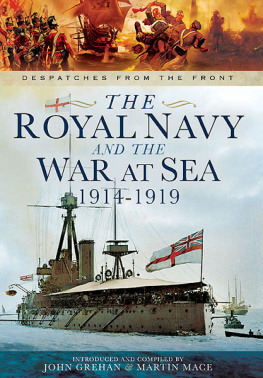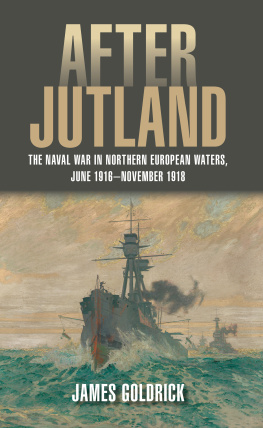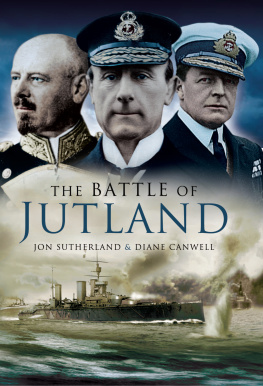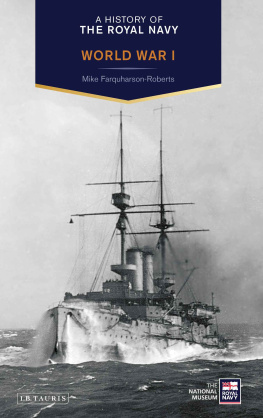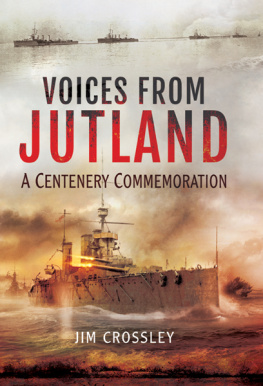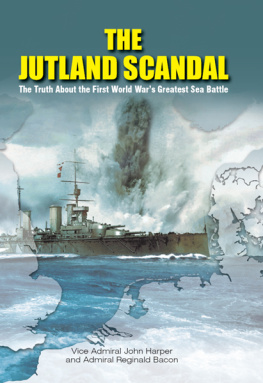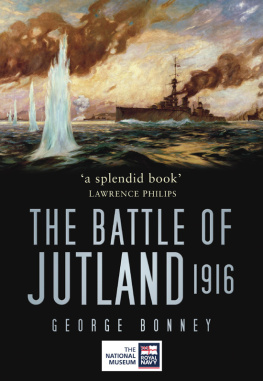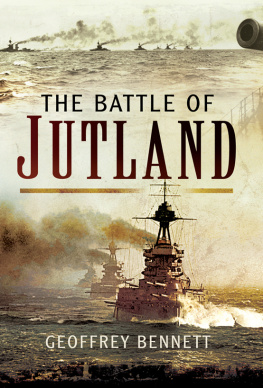Jutland
FOREIGN MILITARY STUDIES
History is replete with examples of notable military campaigns and exceptional military leaders and theorists. Military professionals and students of the art and science of war cannot afford to ignore these sources of knowledge or limit their studies to the history of the US armed forces. This series features original works, translations, and reprints of classics outside the American canon that promote a deeper understanding of international military theory and practice.
SERIES EDITOR: Roger Cirillo
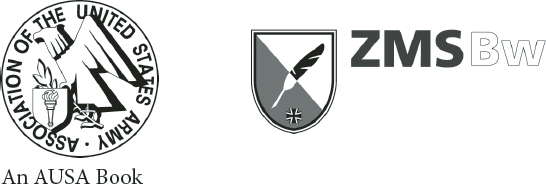
Jutland
World War Is
Greatest Naval Battle
Edited by
Michael Epkenhans,
Jrg Hillmann,
and Frank Ngler

Due to variations in the technical specifications of different electronic
reading devices, some elements of this ebook may not appear
as they do in the print edition. Readers are encouraged
to experiment with user settings for optimum results.
Copyright 2015 by Zentrum fr Militrgeschichte und Sozialwissenschaften der Bundeswehr (ZMS).
Published by special arrangement with Zentrum fr Militrgeschichte und Sozialwissenschaften der Bundeswehr (ZMS). The original edition was published under the title Skagerrakschlacht: VorgeschichteEreignisVerarbeitung and edited by Michael Epkenhans, Jrg Hillmann, and Frank Ngler (Munich: Revised Edition 2011, 2009 Oldenbourg Wissenschftsverlag Odenberg).
English-language edition published by the University Press of Kentucky.
Scholarly publisher for the Commonwealth,
serving Bellarmine University, Berea College, Centre College of Kentucky, Eastern Kentucky University, The Filson Historical Society, Georgetown College, Kentucky Historical Society, Kentucky State University, Morehead State University, Murray State University, Northern Kentucky University, Transylvania University, University of Kentucky, University of Louisville, and Western Kentucky University.
All rights reserved.
Editorial and Sales Offices: The University Press of Kentucky
663 South Limestone Street, Lexington, Kentucky 40508-4008
www.kentuckypress.com
Library of Congress Cataloging-in-Publication Data
Jutland : World War Is greatest naval battle / edited by Michael Epkenhans, Jrg Hillmann, and Frank Ngler.
pages cm. (Foreign military studies)
Includes index.
ISBN 978-0-8131-6605-6 (hardcover : alk. paper) ISBN 978-0-8131-6606-3 (pdf) ISBN 978-0-8131-6607-0 (epub)
1. Jutland, Battle of, 1916. I. Epkenhans, Michael, editor, author. II. Hillmann, Jrg, editor, author. III. Ngler, Frank, 1953- editor, author.
D582.J8J79 2015
This book is printed on acid-free paper meeting the requirements of the American National Standard for Permanence in Paper for Printed Library Materials.

Manufactured in the United States of America.

| Member of the Association of
American University Presses |
Contents
Hans-Joachim Stricker
Hans Ehlert
Michael Epkenhans, Jrg Hillmann, and Frank Ngler
Nicholas A. M. Rodger
Frank Ngler
James Goldrick
Andrew Lambert
Michael Epkenhans
Werner Rahn
John Brooks
Eric Grove
Jrg Hillmann
Jan Kindler
Michael Salewski
Foreword to the First Edition
On 31 May 2006, at Reinbek Castle, when I was given the opportunity to address the participants of the conference The Battle of Jutland, 90 Years Later, I was able to point out that ninety years earlier, at the same time of day, at 1914h, the commander of the High Seas Forces had just ordered a foray by his large cruisers, which shortly after would provide cover for a third battle turn [Gefechtskehrwendung].
This kind of commemoration is only a matter of narrating tactical details. But in the broader perspective of the present era, I would categorize the investigation of this event as an education in politics and history. What we need to grasp is that this event does not fall into the category of practical instruction for warfare, nor does it fall into the area of long tradition. Ships and units will experience completely different leadership and deployment requirements. The spectrum of tasks has clearly changed and expanded many times over. With respect to tradition, I would certainly not normally consider having the units under my command in the German navy interrupt their daily routine to commemorate a day in history. But two years ago an exception was made: On 31 May 2006 the destroyer HMS Edinburgh and the frigate Hessen carried out a simple ceremony, a passing exercise, at Jutland. The commander of the frigate Hessen made the following report from sea via telex to his commander as follows:
In memory of the Battle of Jutland ninety years ago, the British destroyer Edinburgh and the frigate Hessen met in the North Sea, at 5756.0N300939.0E1, for a memorial ceremony. The ceremony was organized and carried out excellently on the part of the Royal Navy.
In accordance with the days planned events, at 310620Z2 MAI 06 a small delegation under the leadership of the first officer of the Hessen was picked up by an English helicopter and flown to the Edinburgh. After a short reception, a muster and a memorial service was performed by the chaplain from the Edinburgh. As part of the half-hour ceremony, a wreath, donated by the Naval Officers Association [Marineoffizier Vereinigung], was placed on the waters in honor of the fallen. The crew of the Hessen was able to participate in the ceremony from the assembly area on deck.
Forty years earlier, a similar meeting of British and German ships took place at Jutland. In 1966 the British destroyers HMS Dainty and HMS Defender and, on the German side, the frigates Karlsruhe and Braunschweig took part. Yet it was different from todays event. This gives me the opportunity to look into the changes that have taken place in the handling of this event.
The gathering of 1966 took place within a larger ceremonial context. Veterans of 1916 were on board the ships, while the national anthem was played and wreaths were placed on the water in memory of the event and of those who fell. While this ceremony marking the fiftieth anniversary was a very momentous occasion, the ninetieth recurrence of this date seems less so.
Nevertheless, the efforts made over the 1966 ceremony held more significance, I believe, because of its proximity to the original event. Further, in 1966 it was even more important to demonstrate mutual solidarity in a visible way. And in any case, in 1966 it was also still considered a good thing, at least in the Bundesmarine, to understand the importance of asserting our victory at Jutland.
In a naval history handbook given to naval officers at that time, the author still found it important to state that the British side had had to swallow an embarrassing defeat. This is no longer found in todays teaching materials.
Next page
